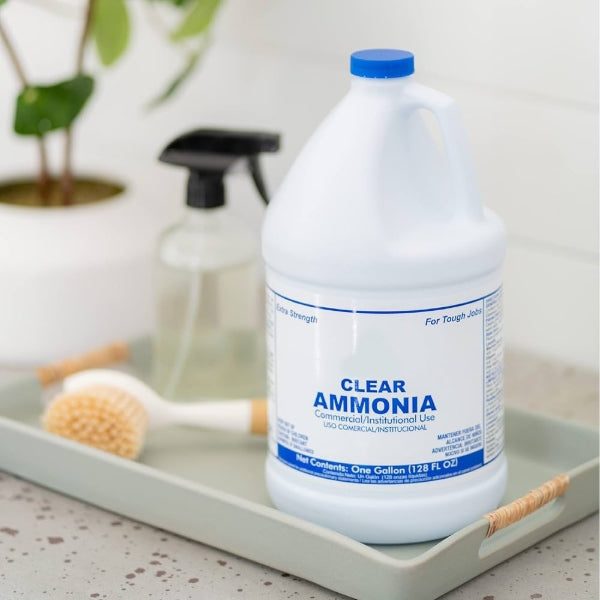
What Cleaning Supplies Contain Ammonia?
Share
The Complete Guide to Ammonia in Cleaning Products
Discover which products contain ammonia, how it works, and safe usage practices for sparkling clean results
Did you know? Ammonia is one of the most powerful and versatile cleaning agents found in your home, but knowing how to use it safely can make all the difference between effective cleaning and potential hazards.
Ammonia has been a cleaning powerhouse for decades, renowned for its ability to cut through the toughest grease, eliminate stubborn stains, and leave surfaces sparkling clean. This comprehensive guide will transform you into an ammonia expert, helping you harness its cleaning potential while keeping your family safe.
🧪 What Makes Ammonia Such a Cleaning Superstar?
Ammonia is a colorless gas with a distinctive, sharp odor that becomes a cleaning champion when dissolved in water. Its molecular structure gives it unique properties that make it incredibly effective at breaking down organic compounds, dissolving grease, and lifting stains that other cleaners struggle with.
💪 Powerful Degreasing
Cuts through kitchen grease and grime like a hot knife through butter
✨ Streak-Free Shine
Leaves glass and mirrors perfectly clear without residue
🎯 Versatile Application
Works effectively on multiple surface types and materials
🏠 Which Cleaning Products Pack the Ammonia Punch?
You might be surprised to discover just how many of your everyday cleaning products contain ammonia. Here's your complete roadmap to ammonia-containing cleaners:
- Glass Cleaners - Your go-to for streak-free windows and mirrors
- Floor Cleaning Solutions - Especially for tile, linoleum, and sealed hardwood
- All-Purpose Cleaners - Multi-surface powerhouses for kitchen and bathroom
- Oven Cleaners - Heavy-duty grease fighters for tough baked-on messes
- Carpet Spot Cleaners - Specialised stain removal formulations
- Metal and Jewelry Polish - Restore shine to chrome, silver, and other metals
Pro Tip: Always check the ingredient list on your cleaning products. Ammonia may be listed as "ammonium hydroxide" or simply "ammonia solution."
🔬 The Science Behind Ammonia's Cleaning Power
Understanding how ammonia works helps you use it more effectively. When ammonia dissolves in water, it creates an alkaline solution that excels at:
- Breaking down proteins - Perfect for removing food stains and organic matter
- Cutting through grease - The alkaline nature dissolves fatty deposits
- Neutralising odors - Chemically bonds with odor-causing compounds
- Evaporating cleanly - Leaves no residue when properly diluted
🏡 Room-by-Room Ammonia Applications
🍳 Kitchen
Stovetops, ovens, microwaves, and greasy countertops
🛁 Bathroom
Soap scum, hard water deposits, and chrome fixtures
🪟 Windows
Glass surfaces, mirrors, and sliding doors
🧽 General Cleaning
Floors, walls, and washable surfaces
⚠️ Critical Safety Guidelines You Must Follow
NEVER mix ammonia with bleach or any chlorine-based products! This combination creates deadly chloramine gas that can cause serious respiratory damage or death.
Safe ammonia use requires following these essential precautions:
- Always ensure excellent ventilation - open windows and use fans
- Wear protective gloves to prevent skin irritation
- Use eye protection when cleaning overhead surfaces
- Store products securely away from children and pets
- Never mix with other cleaning products
- Test on inconspicuous areas first
🌱 Health and Environmental Considerations
While ammonia is generally biodegradable and breaks down naturally in the environment, proper use and disposal are crucial for health and safety:
- Respiratory sensitivity: Some people may experience irritation from fumes
- Skin contact: Can cause redness or burning sensation
- Environmental impact: Generally low when used as directed
- Proper disposal: Follow local guidelines for chemical disposal
⚔️ Ammonia vs. Other Cleaning Champions
How does ammonia stack up against other popular cleaning agents?
🧴 Ammonia
Best for: Grease, glass, general cleaning
Avoid: Natural stone, painted surfaces
🧽 Bleach
Best for: Disinfecting, whitening
Avoid: Mixing with anything!
🍋 Vinegar
Best for: Mineral deposits, deodorising
Natural alternative
🧂 Baking Soda
Best for: Scrubbing, odor absorption
Gentle abrasive
🌿 Ammonia-Free Alternatives for Sensitive Users
For those who prefer to avoid ammonia, several effective alternatives deliver excellent cleaning results:
Natural Cleaning Superstars:
- White Vinegar: Excellent for removing mineral deposits and deodorising
- Baking Soda: Natural abrasive that neutralises odors
- Lemon Juice: Natural degreaser with fresh scent
- Castile Soap: Plant-based cleaner for general use
❓ Frequently Asked Questions
Is ammonia safe for all surfaces?
No, avoid using ammonia on natural stone (marble, granite), waxed floors, painted surfaces, and certain metals like aluminum. Always test in an inconspicuous area first.
Can I make my own ammonia cleaning solution?
Yes, you can dilute household ammonia with water (typically 1 part ammonia to 10 parts water), but commercial cleaners are formulated for optimal effectiveness and safety.
How should I store ammonia-based cleaners?
Store in a cool, dry place away from heat sources, direct sunlight, and out of reach of children and pets. Keep containers tightly sealed and properly labeled.
What should I do if I accidentally mix ammonia with other cleaners?
Immediately leave the area and get fresh air. If you experience breathing difficulties, dizziness, or chest pain, seek medical attention right away. Never return to clean up the mixture until the area is thoroughly ventilated.
📋 Smart Storage and Disposal Practices
Proper storage prevents accidents and maintains product effectiveness:
- Keep in original containers with intact labels
- Store in cool, dry locations (avoid garages or basements with temperature fluctuations)
- Ensure tight seals to prevent evaporation and odor release
- Check expiration dates regularly
- Dispose of expired products according to local hazardous waste guidelines
Transform Your Cleaning Routine Today!
Armed with this comprehensive knowledge about ammonia in cleaning products, you're now equipped to make informed decisions that balance powerful cleaning results with safety and health considerations. Remember: the key to successful ammonia use lies in understanding its strengths, respecting its power, and following safety guidelines religiously.
Happy cleaning, and stay safe!

